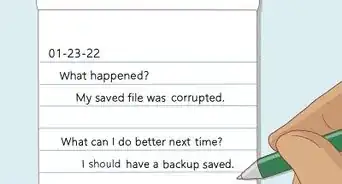This article was co-authored by Melody Godfred, JD. Melody Godfred is a Career Coach, Entrepreneur, and Founder of Write In Color, a full-service resume and career development company that specializes in developing compelling personal narratives and brands. With over ten years of experience, Melody has worked with clients at entertainment and media companies including Apple, Disney, Fox, Netflix, Riot Games, Viacom, and Warner Bros, among others. The Muse invited Melody and Write In Color to serve as one of its 30 trusted career counselors (out of 3,000) to provide one-on-one coaching and resume services to the platform's more than four million active users. Melody earned a JD from Loyola Marymount University and BS from the University of Southern California.
There are 7 references cited in this article, which can be found at the bottom of the page.
This article has been viewed 97,451 times.
We all encounter negative situations in life, whether we’re at work or not. Negative work situations can be particularly troubling, though, because we spend so much time there and we depend on our jobs to maintain daily life. If you are finding it difficult to navigate negative work interactions, there are a few things you can do to stay positive no matter how much conflict you encounter.
Steps
Controlling Your Internal Response
-
1Stay calm. When you are confronted with a conflict at work, whether directed toward you, a coworker, or your team in general, it’s important to stay calm. This will help you evaluate the situation in order to make the wisest decisions possible.
- Quickly perform any routines you have in place for relaxing under pressure, such as taking a deep breath or counting to ten. If you don’t have any, learn some.[1]
- Try walking away instead of speaking.
- Once you’ve walked away, use your five senses to calm down.[2] For example, you could keep soothing aromatherapy at your desk in the form of a candle or bottle of essential oil.
-
2Accept the situation. If you resist the negative situation you are facing at work, this will only increase your internal conflict.[3] Such resistance will more than likely force you into a negative reaction, which will escalate the conflict. Instead, accept what is happening around you.[4]
- If a negative situation at work is ongoing, accepting the situation will help you face the problem and get it resolved, rather than letting it drag out and become a constant burden. [5]
Advertisement -
3Remind yourself of things you’re good at. In the middle of a negative interchange, it’s tempting to feel badly about yourself. This negative feeling can make you defensive, causing a negative response. Focus on what you are good at until the exchange has ended.
- Think about a project you recently worked on that you got praised for.
- Think about all the classes you took or experience you have on your resume qualifying you for your position.
Reacting Externally in a Positive Way
-
1Avoid a negative reaction. Be kind instead of responding the same way the negative person is behaving. If someone is being aggressive, it is best to diffuse this tension by being passive in the moment.[6]
- Resist the temptation to fight back. Being defensive in the moment will quickly escalate a negative situation.
- Try to say things that avoid confrontation. You could say something like, "I was not aware of the error," or "I apologize for any confusion my actions may have caused."
-
2Avoid engaging in the conflict.[7] Refuse to engage with anyone who comes at you with an accusation. Staying calm and simply listening can prevent the conflict from escalating. Once the person is calmer, acknowledge his or her feeling before presenting your own. If things continue to escalate, formally ask your manager or HR representative for support via email to document the conflict.
- Offering a neutral point of view, whether you’re involved in a conflict or are hearing about someone else’s, can be a calming agent.[8]
- Offering a neutral point of view can mean that you don't take sides; instead, you agree that both parties could be right, and neither is justified until evidence proves otherwise.
-
3Speak slowly. This gives you time to think about what you’re going to say, and makes you appear confident. Speaking slowly also makes you look purposeful and precise, contributing to an air of confidence.
- Appearing confident—not arrogant—in the midst of a personal attack may prevent the accusing party from going too far in their negativity.
-
4Stay humble and transparent. If a coworker or supervisor is accusing you of a misstep, readily confess your part of the issue. Humility like this can quickly diffuse a volatile situation.
- If you feel that you did no wrong, don’t be arrogant or defensive about this fact. Be open to the idea that you might have done what they are accusing you of, and offer to try to find the cause of the error.
- Some ways to respond with humility might be to defer to the superior person's experience or to admit you are not as skilled as you thought you were in the area in question.
-
5Admit your part. If you are facing a negative situation which you have contributed to (intentionally or not), admit your error. As said in the part above this one, humility can quickly diffuse a volatile situation.
- Admission of error will also make the other party more disposed to reaching a peaceful resolution.
-
6Remove yourself from the situation. If nothing you have tried is working—apologizing, staying calm, keeping out of the conflict—it may be best to walk away.[9] If you back away slowly, this might be easier for the other party to take than if you just turn on your heel and stomp away.
- This may be hard to do, especially if someone is wrongfully accusing you or calls you a coward, but to avoid escalating the conflict, you may need to leave the room.
- This does not make you a coward. Initially, what this does is allow you and the opposing party time to cool down and rationally decide a course of action. In the workplace, this is usually the most desired result.
-
7Maintain a professional demeanor. If you are in an ongoing negative situation, or are friends with someone who is, it can be tempting to snub, even provoke, the offending party. However, to minimize negative situations and interactions, treat all coworkers equally and with professionalism.
- Treating everyone professionally prevents playing favorites, a situation that can cause further reason for tensions to rise.
- Don’t avoid interacting with a coworker because of a recent or ongoing conflict. Determine to treat them professionally, and you may find that the conflict minimizes on its own.
Keeping a Positive Attitude
-
1Perform positive self-talk. It’s important to maintain a positive attitude both during and after a negative situation at work, especially if a conflict becomes ongoing. Keep yourself encouraged by telling yourself what you are good at.
- Remind yourself of the things you do well at work. Keep encouraging emails and notes from bosses and coworkers and look over them.
- Don’t bully yourself by telling yourself “I should have…” and don’t expect too much from yourself.
-
2Apply past solutions. Think about similar negative situations you have encountered in the past. Try to remember what you did then in order to stay positive, and apply it here and now.
- For example, you may have made a mistake on a document you turned in to your boss, which is similar to a mistake you have made on a document you gave to your supervisor. How did you repair the first error? Repair it this time the same way.
-
3Look for a silver lining. After an initial conflict, it is helpful to make lists of positive things about your job or the specific task in question.[10] Take out this list of “good things” whenever you are temped to become angry, and choose to be thankful for them.
- Being thankful will help you change your perception from negative to positive.
-
4Think about happy things. Distract yourself from wanting to retaliate in the moment by thinking about things that make you happy (your family, the beach, etc.). Keeping in mind people and situations that would be affected by your outburst may also keep you from losing your temper.
- You can also choose to generally improve your attitude by interpreting everything in a positive light.
- For example, you can accept a compliment for its face value instead of wondering what you could have done to make the person say even more, or wondering why they haven’t said anything before.
-
5Banish negative thoughts. Thinking about happy things means you need to keep negative thinking at bay. To do this, arrest negative thoughts and ask yourself if they are true, and consider different explanation when you are tempted to think the worst of workplace communications (or lack of them). [11]
- Focus on things that are within your power to perform, not on things out of your control.
- In general, people who maintain positive thinking tend to live longer.[12]
-
6Get positive advice. If you are the one in the middle of a conflict, you may want to seek wise counsel for how to handle the situation. This may be your boss, supervisor, or even a long-standing coworker. The point is to find someone who will give you positive advice instead of focusing on the negative.
- If no one in your department can give objective advice, you may want to reach out to a trusted friend in another department, or even Human Resources (HR).
-
7Stay away from gossip. Stay away from discussing the conflict with coworkers who like to gossip.[13] These people will tend to focus on the negative aspects and spread your perspective around to others, making the conflict worse.
- By the same token, if you are being a sounding board for someone else’s conflict, choose not to gossip yourself. Commit yourself to confidentiality and encourage the person to confront their conflicting party in person.[14]
-
8Perform tasks that are a result of conflict resolution. Finally, to show your willingness to cooperate, do what is asked of you as a result of the conflict. Being a compliant employee and coworker makes everything work more smoothly.
- If you are ever asked to do something that makes you uncomfortable, speak up. Tell someone who has authority, like your boss or HR.
Warnings
- Don’t let anyone blackmail you or try to manipulate you in order to keep information hidden. Tell someone in authority at your workplace immediately if the idea of blackmail is suggested.⧼thumbs_response⧽
References
- ↑ http://www.helpguide.org/articles/stress/relaxation-techniques-for-stress-relief.htm
- ↑ http://www.helpguide.org/articles/relationships/conflict-resolution-skills.htm
- ↑ Melody Godfred, JD. Career Coach. Expert Interview. 29 April 2020.
- ↑ http://www.clarke.edu/page.aspx?id=3568
- ↑ https://www.psychologytoday.com/blog/insight-therapy/201009/emotional-acceptance-why-feeling-bad-is-good
- ↑ http://www.helpguide.org/articles/relationships/conflict-resolution-skills.htm
- ↑ Melody Godfred, JD. Career Coach. Expert Interview. 29 April 2020.
- ↑ http://www.clarke.edu/page.aspx?id=3568
- ↑ Melody Godfred, JD. Career Coach. Expert Interview. 29 April 2020.
- ↑ https://hbr.org/2009/11/how-to-survive-in-an-unhappy-w.html
- ↑ http://www.mentalhealthamerica.net/stay-positive
- ↑ http://www.mentalhealthamerica.net/stay-positive
- ↑ Melody Godfred, JD. Career Coach. Expert Interview. 29 April 2020.
- ↑ http://www.clarke.edu/page.aspx?id=3568










































































